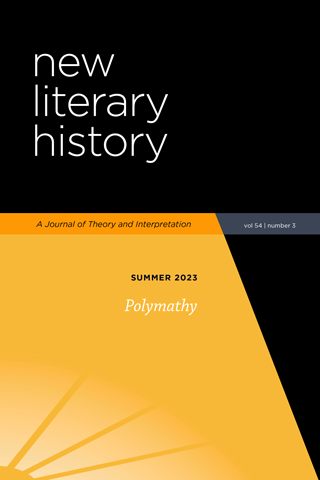
54, 3 (2023)
Polymathy
- Herbert Tucker and Bruce Holsinger, “Polymathy: Introduction”
- Kevin Hart, “Saying Everything”
- Ahmed H. al-Rahim, “Early Medieval Arabic Polymathy: A Preliminary Sketch”
- Hans Ulrich Gumbrecht, “Expansive Energy: An Alternative Portrait of Denis Diderot”
- Kathryn A. Neeley, “The Peculiar Illumination of the Polymathic Mind: Mary Somerville, William Whewell, and the Disciplinary Formation of the Sciences”
- Fakrul Alam, “‘A Living Growth’: Rabindranath Tagore and Polymathy”
- Stephen Nachmanovitch, “Being Whole”
- Merve Emre, “Sons and Mothers: or, The Polymath and the Philologist”
- Peter Burke, “Response”
54, 2 (2023)

Spring 2023
- Susan Fraiman, “Memory Work and Dirty Work: Writing the Labor of Eldercare”
- Samantha Pergadia, “Slaughterhouse Intimacies”
- Emily Apter and Katie Kitamura, “Interpreters in Court” (Creative Writing and Critical Thought II)
- Zoë Roth, “How to Survive Totalitarianism: Lessons from Hannah Arendt”
- Wolfram Schmidgen, “Appreciation After Critique”
- Dustin D. Stewart, “Coupling Men in Couplet Space: Pope to Gunn”
- Derek Woods, “Genre at Earth Magnitude: A Theory of Climate Fiction”
- Fredrik Renard, “The Homelessness of the Novel: Friedrich Blanckenburg and Novel Poetics”
Literary Cybernetics: A New Literary History Forum
Coeditors: Heather A. Love and Lea Pao
- Heather A. Love and Lea Pao, Introduction, “Literary Cybernetics: History, Theory, Post-Disciplinarity”
- Jack W. Chen, “On Poems (System and Environment)”
- Paul Jaussen, “The Art of Distinction”
- Megan Ward, “The Marriage Plot, Again: A Feedback Loop”
- Marc Kohlbry, “New Noise?”
- Ada Smailbegović, “‘2 < n < infinity’: A Multilayered ‘Phyllo Dough of the Analog and the Digital’ in Alison Knowles and James Tenney’s The House of Dust”
- Aaron Jaffe, “The Double Repatriations of Cybernetics and Media Theory: Vilém Flusser and Heinz von Foerster”
- Avery Slater, “‘Hermenautics’: Towards a Disinformation Theory”
- Michael F. Miller, “‘Stop Asking for Life to Be a Poem’: On Cybernetic Instrumentality”
- Lea Pao, “Ways of Cybernetic Thinking”
Respondents:
- Bruce Clarke, “Staying Alive: Cybernetic Persistence”
- N. Katherine Hayles, “Literary Cybernetics: The Point (of the Spear)”
53, 4 and 54, 1 (2023)
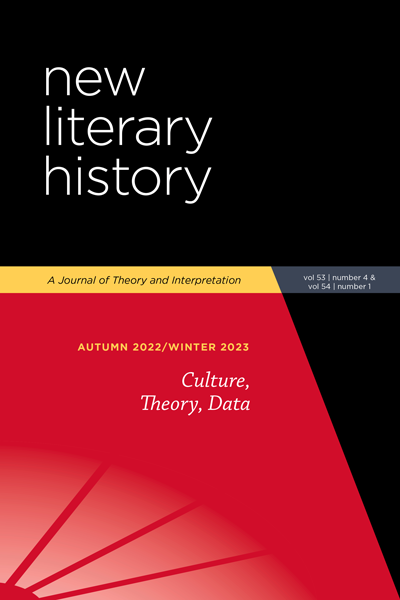
Culture, Theory, Data
- Ted Underwood, Laura McGrath, Richard Jean So, Chad Wellmon, “Culture, Theory, Data: An Introduction”
- Katherine Bode, “Doing (Computational) Literary Studies”
- Alison Booth, “But Why Always the Novel? Midrange Reading Samples of Persons and Texts”
- Sarah Bruno and Jessica Marie Johnson, “‘Que Recogan Este Memoria’: Black Puerto Rican Data”
- Michael Gavin, “Why Distant Reading Works”
- N. Katherine Hayles, “Inside the Mind of an AI: Materiality and the Crisis of Representation”
- Long Le-Khac, Maria Antoniak, and Richard Jean So, “#BLM Insurgent Discourse, White Structures of Feeling and the Fate of the 2020 ‘Racial Awakening’”
- Caroline Levine, “Literary Studies and Collective Life”
- Hoyt Long, “Learning to Live with Machine Translation”
- Joan Lubin, “Medium Specific Sexuality”
- Laura B. McGrath, “‘Books about Race’: Commercial Publishing and Racial Formation in the 21st Century”
- Tess McNulty, “Content’s Forms”
- Laura K. Nelson, “Situated Knowledges and Partial Perspectives: A Framework for Radical Objectivity in Computational Social Science and Computational Humanities”
- Andrew Piper and Sunyam Bagga, “Toward a Data-Driven Theory of Narrativity”
- Dennis Yi Tenen, “Distributed Agency in the Novel”
- Matt Warner, “A Queer Way of Counting: Bibliography and Computational Approaches to the Queer Novel”
Respondents:
- Roopika Risam, “Our Paratextual Presents, Our Computational Literary Futures”
- Clayton Childress, “Bringing Computation into Cultural Theory: Four Good Reasons (and One Bad One)”
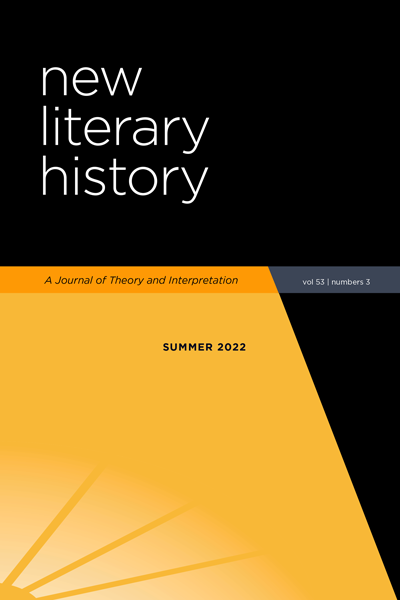
53, 3 (2022)
Summer 2022
- Emily Steiner, “Neck Verse”
- Aleksandar Stević, “The Homological Imagination: Toward a Critical History of Political Formalism”
- Seo Hee Im, “Pain and Prejudice in the World Literary Market”
- Ingrid Becker, “Socio/Poetics”
- Keidrick Roy, “Well-Wrought Black Thought: Speculative Realism and the Specter of Race”
- Henry Staten, “The Body-Mind Split: Cavell vs. Wittgenstein”
- Stephanie Burt and Emmy Waldman, “What Comics Can Say about Lyric, or, Reading with Gwenpool”
53, 2 (2022)

Spring 2022
- Stephanie Ann Frampton, “Rhetorics of Becoming: Between Metamorphosis and Metaphor”
- Victoria Googasian, “Feeling Fictional: Climate Crisis and the Massively Multi-Protagonist Novel”
- Sara Fernandes and Lydia Saleh Rofail, “Perpetual Becoming, Deferred Arrival: The Author-Hero in the Age of Digital Celebrity”
- Jason de Stefano, “The Gospel of Creativity”
- Carolyn Dinshaw and Garth Greenwell, “Queer Theory/Queer Fiction” (Creative Writing and Critical Thought I)
- Doyle Calhoun, “Dead Narrators, Queer Terrorists: On Suicide Bombing and Literature”
- Winner of the 2021 Ralph Cohen Prize
- Zhao F. Ng, “The Kingdom and the Pilgrim’s Way: Epic, Irony, and Rebecca West’s Black Lamb and Grey Falcon”
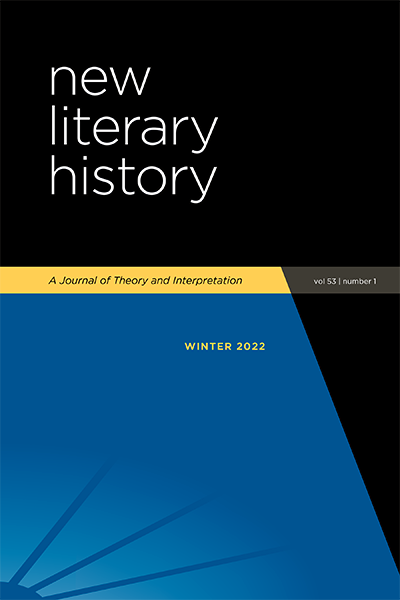
53, 1 (2022)
Winter 2022
- Hannah Weaver, “Interpolation as Critical Category”
- Adrienne Ghaly, “What Does Biodiversity Loss Feel Like? Realism in the Age of Extinction”
- Arthur Rose, “Recovering Franz Kafka’s Asbestos Factory”
- Cajetan Iheka, “Intricate Intimacies: Reading the Transatlantic Queer in Dinaw Mengestu’s All Our Names”
- Andrew M. McClellan, “Lil Wayne, Imitatio, and the Poetics of Cannibalism”
- Garrett Stewart, “Verbal Fframe-Advance: Toward a Cinematographic Sentence”
- Tobias Skiveren, “Postcritique and the Problem of the Lay Reader”
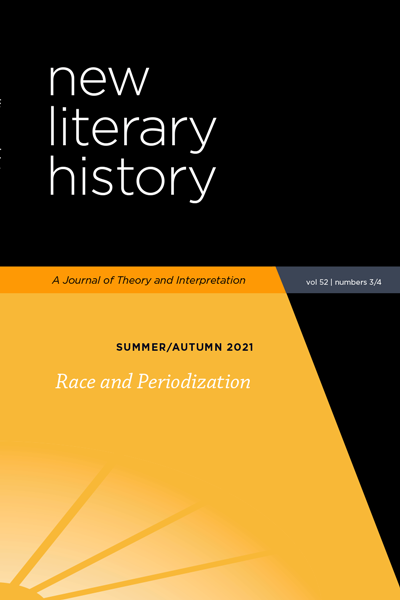
52, 3/4 (2021)
Race and Periodization
- Urvashi Chakravarty and Ayanna Thompson, “Race and Periodization: Introduction”
- Margo Hendricks, “Coloring the Past, Considerations on Our Future: RaceB4Race”
- Mary Rambaran-Olm, “A Wrinkle in Medieval Time: Ironing out Issues Regarding Race, Temporality, and the Early English”
- Haruko Momma, “The Theater of Race and Its Supporting Actors: A Tale of Two Islands”
- Farid Azfar, “Leviathan and the Asiento: A Counter-History of the Racial Contract”
- Nicole Lopez-Jantzen, “Historiography, Periodization, and Race: Italy between Antiquity and the Middle Ages, Europe and Africa”
- Nizar F. Hermes and Mary Beth Allen, “A Tale of Two Sultans: Franco-Moroccan ReInventions of Mūlāy Ismāʿīl and his Marriage Proposal to La Princesse de Conti”
- Su Fang Ng, “Making Race in the Early Modern East Indies”
- Wan-Chuan Kao, “In the Lap of Whiteness”
- Carol Meija LaPerle, “Ill-Will as Racialized Affect: Early Modern Volition, Critical Race Theory, and Shakespearean Ill-Will”
- Kyle Grady, “Emphasis and Elision: Early Modern English Approaches to Racial Mixing and their Afterlives”
- Ruben Espinosa, “Traversing the Temporal Borderlands of Shakespeare”
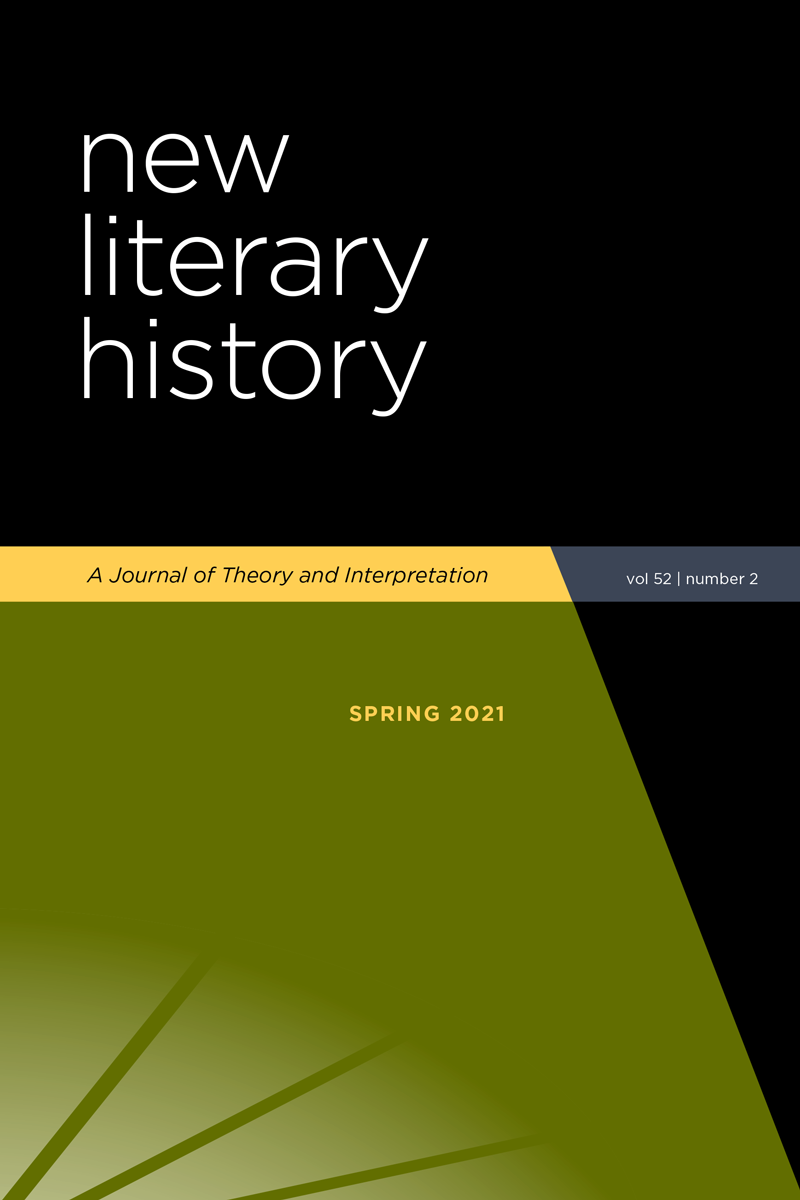
52, 2 (2021)
Spring 2021
- Audrey Wasser, “Critical Thinking”
- Christopher Braider, “Squaring the Circle: Aesthetics and Its History”
- Shaj Mathew, “Ekphrastic Temporality” (2020 Ralph Cohen Prize winner)
- Rachael Scarborough King, “The Scale of Genre”
- Wayne Stables, “What is the Matter? A Meditation on Illegible Writing”
- Helen Solterer, “A Timely Villon: Anachrony and Premodern Poetic Fiction”
- Avery Slater, “Primo Levi’s Chernobyl: Ecology and Trauma in The Reawakening”
52, 1 (2021)
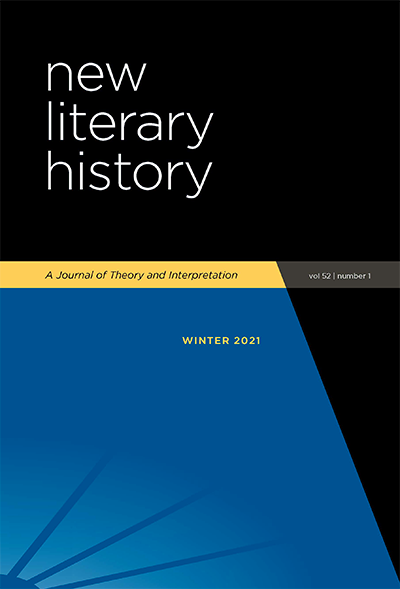
Winter 2021
- Joel M. Childers, “The Romance of Criticism”
- Cecilia Feilla, “Future Perfect History: Historiography and Republican Space-Time in French Revolutionary Theater”
- David Kurnick, “Jane Austen, Secret Celebrity, and Mass Eroticism”
- John Lurz, “The Sorceress’s Apprentice: Roland Barthes and the Criticism of Magic”
- Rita Felski, “Recognizing Class”
- Ana Schwartz, “Anne Bradstreet, Arsonist?”
- Kayvan Tahmasebian and Rebecca Ruth Gould, “Ajnabi, Or the Xenological Uncanny in Iranian Modernism”
- Eric Weiskott, “Futures Past: Prophecy, Periodization, and Reinhart Koselleck”
51, 4 (2020)
Animality/Posthumanism/Disability
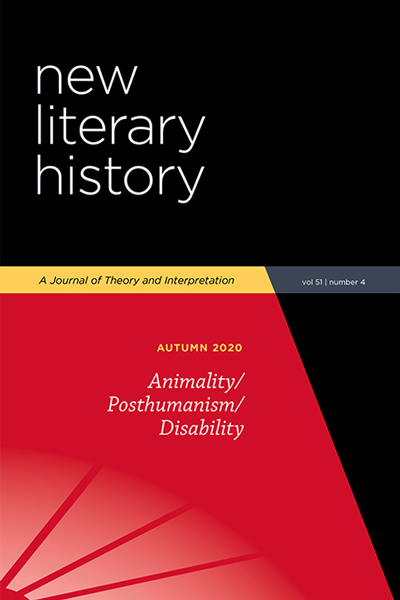
Special issue edited by Michael Lundblad
- Michael Lundblad, “Animality/ Posthumanism/ Disability: An Introduction”
- Sunaura Taylor, interviewed by Sara E. S. Orning, “Being Human, Being Animal: Species Membership in Extraordinary Times”
- Judith Butler, “Companion Thinking: A Response”
- Rachel Adams, “The Art of Interspecies Care”
- Jack Halberstam, “Beyond Caring: Human-Animal Interdependency: A Response”
- Rachel Adams, “We Have Laws for That: A Response to Jack Halberstam”
- Matthew Chrulew, “Abnormal Animals”
- Dinesh Wadiwel, “Restriction, Norm, Umwelt: A Response”
- Michael Lundblad, “Disanimality: Disability Studies and Animal Advocacy,”
- Nirmala Erevelles, “The Political Economy of Disanimality: A Response”
- Jan Grue, “On the Transhumanist Imaginary and the Biopolitics of Contingent Embodiment”
- David T. Mitchell, “Where Are You Taking Us? A Response”
- Cary Wolfe, “The Biopolitical Drama of Joseph Beuys”
- Neel Ahuja, “Animal Death as National Debility: Climate, Agriculture, and Syrian War Narrative”
- Jasbir K. Puar, “Atmospherics of War: A Response”
51, 3 (2020)
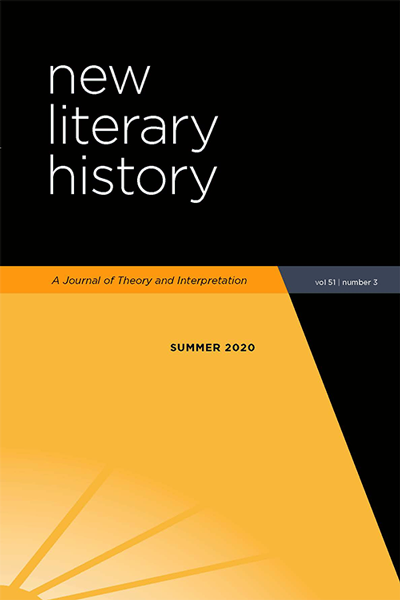
Summer 2020
- Nan Z. Da, “Other People’s Books”
- Atti Viragh, “The Grammar of Instress: Gerard Manley Hopkins and the Victorian Philosophers of Mind” (Winner, 2019 Ralph Cohen Prize)
- Joseph Albernaz, “Fragmentary Domestic: Wordsworth’s Image of the Common”
- Joshua Billings, “Nietzsche’s Philology of the Present”
- Brian Glavey, “Lyric Wilt, or, The Here and Now of Queer Impotentiality”
- John Hoffmann, “The Volk against Fascism: Socialist Realism and the Aesthetics of Expressionism”
- Walt Hunter, “The American Poetic Subprime: Contemporary Poetry, Race, and Genre”
- Brian Michael Norton, “Aesthetics, Science, and the Theater of the World”
51, 2 (2020)
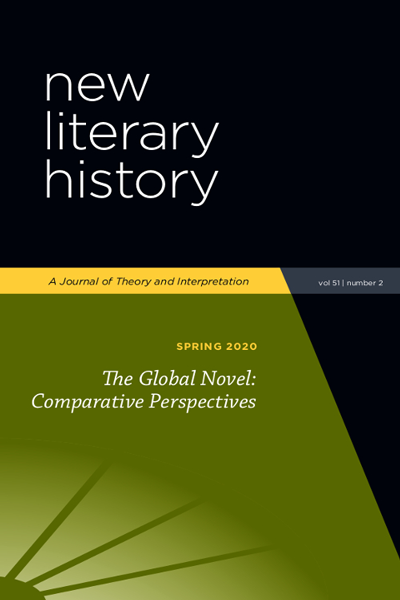
The Global Novel
- Debjani Ganguly, “Introduction”
- Michael Allan, “Dying to Read: Reflections on the Ends of Literacy”
- Baidik Bhattacharya, “Radical Illegibility and Democratic Futures: Reading Orhan Pamuk and J. M. Coetzee”
- Rebecca L. Walkowitz, “On Not Knowing: Lahiri, Tawada, Ishiguro”
- Ignacio M. Sánchez Prado, “The Persistence of the Transcultural: A Latin American Theory of the Novel from the National-Popular to the Global”
- Daniel Y. Kim, “Translations and Ghostings of History: The Novels of Han Kang”
- Ranjana Khanna, “Touching the Corpse: Reading Sinan Antoon”
- Debjani Ganguly, “Catastrophic Form and Planetary Realism”
- Sarah Nuttall, “Pluvial Time/Wet Form”
51, 1 (2020)
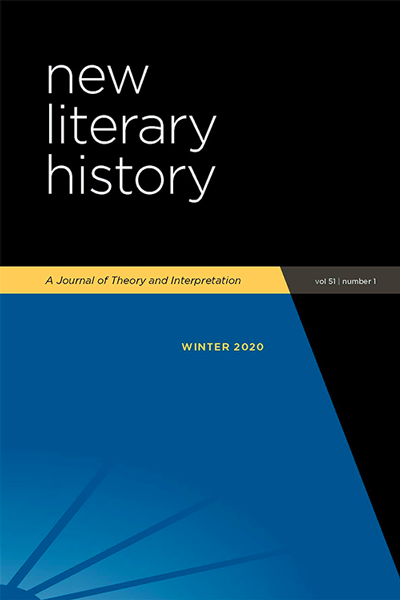
Winter 2020
- Heather Houser, “Shimmering Description and Descriptive Criticism”
- Linda M. Austin, “Psychometric Wunderkammern: Word-Association Testing and the Aesthetics of Creative Genius”
- Morgan Day Frank, “Don’t Read.”
- Michael Krimper, “Beckett Ongoing and the Novel”
- Elaine Auyoung, “What We Mean By Reading”
- Heather Steffen, “Imagining Academic Labor in the US University”
- Joshua Landy, “In Praise of Depth: or, How I Learned to Stop Worrying and Love the Hidden”
- Michael Dango, “Filtering: A Theory and History of a Style”
- Michelle Karnes, “The Possibilities of Medieval Fiction”
Medieval Fictionalities: An NLH Forum
- Sarah M. Allen and Jack W. Chen, “Fictionality in Early and Medieval China”
- Carol Symes, “Medieval Fictions vs. the Fetish of Modernity”
- Carissa M. Harris, “Pastourelle Fictionalities”
- Sara S. Poor, “The Fuss about Fiction: A View from Medieval German Studies”
- Katharine Eisaman Maus, “Fake News”
- Brandon W. Hawk, “Apocrypha and Fictionality”
- Monika Fludernik, “Medieval Fictionality from a Narratological Perspective”
- Michelle Karnes, “Synchronous Fictions”
- Julie Orlemanski, “What We Ask of Fiction”
50, 4 (2019)
Poetry and Race
- Jahan Ramazani, “Poetry and Race: An Introduction”
- Evie Shockley, “On Seeing and Reading the ‘Nothing’: Poetry and Blackness Visualized”
» ex patria - Urayoán Noel, “The Queer, Migrant Poemics of #Latinx Instagram”
» White Latinidad
» Hay(na)ku Boricua
» Transversal - Josephine Nock-Hee Park, “The Poetics of Consolation: Japanese Aesthetics and American Incarceration”
- Nathan Suhr-Sytsma, “Theories of African Poetry”
- Tsitsi Jaji, “Zimbabwe in Verse: Anthologizing the Nation as Alternative Historiography”
» baba’s voice mail. - Vidyan Ravinthiran, “(Indian) Verse and the Question of Aesthetics”
» My Sri Lankan family
» And so - J. Edward Chamberlin, “Chanting Down Babylon: Poetry and Race”
- Lorna Goodison
» So Who Was the Mother of Jamaican Art?
» To Make Various Sorts of Black
» Sugar
» The Journey of the Three Dreads
50, 3 (2019)
In Brief
- Irina Dumitrescu and Bruce Holsinger, INTRODUCTION
- Sherif Abdelkarim, SĪRAH
- Adélékè Adéẹ̀kọ́, PANEGYRIC
- Stephanie Burt, SONG
- Tim Cassedy, DEFINITION
- Jennifer Chang, FRAGMENT
- Brooke Conti, PRAYER
- Megan L. Cook, BLAZON
- Rita Copeland, ENTHYMEME
- Irina Dumitrescu, EPIGRAM
- Denis Ferhatović, RIDDLE
- Dolores Flores-Silva and Keith Cartwright, FABULA
- Roberta Frank, DRÓTTKVÆTT
- Florian Fuchs, NOVELLA
- Diana Fuss, FLASH
- Cary Howie, MEDITATION
- Andrew Hui, APHORISM
- Andreas Huyssen, MINIATURE
- Eric Jarosinski, TWEET
- Seth Lerer, SCRIBBLE
- Nicola Masciandaro, GLOSS
- John H. Muse, MICRODRAMA
- Haun Saussy, JUEJU
- Jim Seitz, SYLLABUS
- Haruo Shirane, HAIKU
- Elizaveta Strakhov, RONDEAU
- Jesús R. Velasco, MICROBIOGRAPHIES
- Louise Wilson, DEDICATION
- Madeline L. Zehnder, COMPANION
50, 2 (2019)
Spring 2019
- Julie Orlemanski, “Who Has Fiction? Modernity, Fictionality, and the Middle Ages”
- Jerome McGann, “From Cultural Memory to Living Word: On Mather’s Magnalia”
- Ariana Reilly Codr, “After Ever After: The Marriage Plot’s Farewell to Its Reader”
- David Dwan, “Important Nonsense: Yeats and Symbolism”
- Matthew Burroughs Price, “Old Formalisms: Character, Structure, Action”
- Simone Stirner, “A Technique of Closeness, an Art of Straying: Reading with Walter Benjamin”
- Lucas Thompson, “Method Reading”
50, 1 (2019)
NLH at 50
- Bruce Holsinger, “New Literary History at 50: Reflections and Futures”
- Jeffrey J. Williams, “The Rise of the Critical Interview”
- Liesl Yamaguchi, “Sensuous Linguistics: On Saussure’s Synesthesia”
Winner of the Ralph Cohen Prize for 2018 - Erica Weaver, “Premodern and Postcritical: Medieval Enigmata and the Hermeneutic Style”
- Ingrid Nelson, “Poetics of the Rule: Form, Biopolitics, Lyric”
- Michael North, “The Afterlife of Modernism”
– – – –
- Ralph Cohen (1917-2016), “On the Presuppositions of Literary Periods”
- John L. Rowlett, “Ralph Cohen on Literary Periods: Afterword as Foreword”